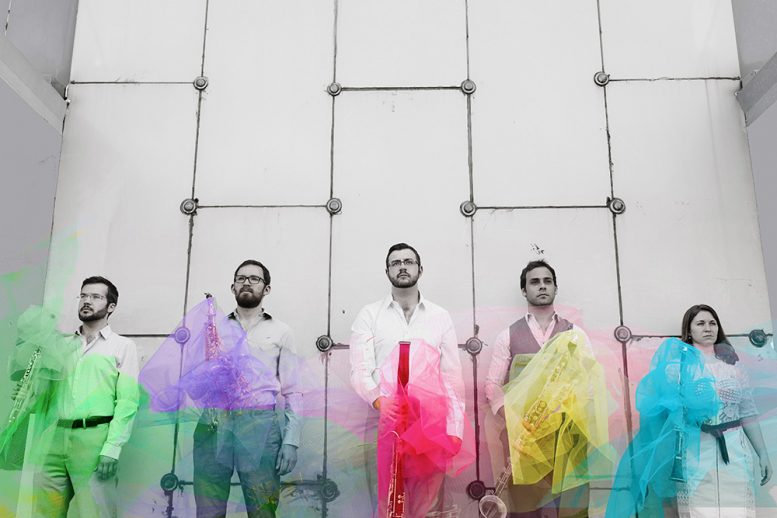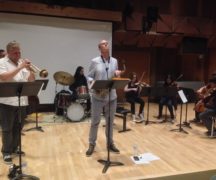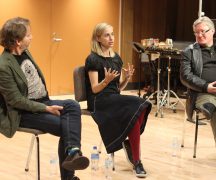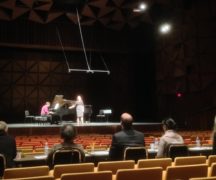By DAVID DUPONT
BG Independent News
When the Akropolis Reed Quintet got started at the University of Michigan, only a handful of compositions had been written for their instrumentation.
Most had been composed for Colefax, a groundbreaking Amsterdam-based ensemble, that also featured clarinet, bass clarinet, saxophone, oboe and bassoon.
Now there are hundreds and hundreds of compositions, and the reed quintet is taking its place with the woodwind quintet and string quartet as established chamber ensembles.
When the National Association for Music Education held its composition competition they asked young composers to write for reed quintet, and the Barlow Endowment sought composers interested in the instrumentation.
The result was “Rites for the Afterlife” by Stacy Garrop.
That piece will open the Akropolis Reed Quintet’s virtual concert Saturday at 8 p.m. as part of the quintet’s virtual residency through the Hansen Musical Arts Series. In addition to the concert, the visiting musicians will work with students in master classes and a discussion on musical entrepreneurship. Details are available on the Hansen series website.
Matt Landry, who is the group’s saxophonist, said they will discuss the difference between being in college and being “dependent on this for a paycheck which is dependent on you giving people a meaningful experience.”
“Hopefully we can help them get a sense of how to make that transition,” he said.
For Akropolis this started from the beginning.
The ensemble got its start when saxophonist Dan Goff, a graduate student, pulled together top undergraduate wind players to explore the wind quintet. Those founding members were Kari Landry, clarinet, Ryan Reynolds, bassoon, Andrew Koeppe, bass clarinet, and Tim Gocklin, oboe.
That first year, the group presented a recital – the ensemble’s founding event. Goff soon left to join the Army Field Band, and Landry assumed the saxophone chair.
From the start, Landry said, they sought performance opportunities outside the confines of the School of Music, Theatre, and Dance.
“We were taking what we learned and doing it for people in real settings,” Landry said. Those opportunities stretched from the museum on campus, to local churches, to venues around the state, and competitions around the country, which offered chances to perform in other states.
They were also a way for Akropolis to establish itself as a chamber ensemble to be reckoned with. They won seven national prizes, including the Fischoff Gold Medal.
Now they have a full-fledged performing career that supports two full-time positions and three part-time positions, Landry said.
Along the way they help to develop the repertoire for the reed quintet. Now, Landry said, there are hundreds of pieces.
All this happened organically.
One step led to another. It helped, he said, that they were young when Akropolis started. “It helps there wasn’t any pressure at first.”
Often as a musician approaches the end of graduate school, they have expectations set about what path they should follow and what kind of help they need to navigate that path. “They have these templates that they’re supposed to work within,” he said.
But they need to set their own goals, and determine for themselves what they want out of music while at the same time respecting their teachers and the tradition.
Akropolis’ approach is illustrated by the story of their christening.
The members of the ensemble were going back and forth about what to call the group. One of them happened upon this municipality in New Jersey called Brick, and the mayor’s last name was Akropolis, Landry recalls. The whimsy and quirkiness caught their attention, and they felt it would be memorable, so they became the Akropolis Reed Quintet. “The name has nothing to do with the Acropolis in Greece,” he said.
Maybe, if they’d been thinking ahead, they’d have thought more about what they wanted to accomplish and where they wanted to go. “We started the group to play good music together,” he said. “The name captures the early haphazardness.”
Now the ensemble has three full-length albums to its name as well as an EP. The fourth full album recording, “Ghost Light,” is set for release in April.
Two pieces from the recording will be performed during Saturday’s livestreamed program.
The concert will open with Garrop’s “Rites for the Afterlife.” Based on Egyptian mythology, the piece is a “cinematic journey of the soul” on its way to the Egyptian nirvana, the field of reeds, Landry said.
The middle piece on the program, “Maktub” by Willem Jeths, was written for the pioneering quintet Colefax in 2013.
Landry described it as a meditative piece, inspired by the book “The Alchemist.”
The concert will close with two movements from “Homage to Paradise Valley,” a musical tribute to Detroit’s historically Black communities, that were torn asunder by highway construction and so-called urban renewal.
The “Hasting Street Blues” movement saunters along with the bass clarinet taking a prominent role. The jaunty fourth movement “Paradise Theater Jump” pays tribute to the venue that hosted top Black talent. It now is home to the Detroit Symphony Orchestra.
“Homage to Paradise Valley” was composed by Jeff Scott, the French horn player for the noted woodwind quintet, Imani Winds. (Imani has performed twice at BGSU.) Akropolis also commissioned Marsha Music, a Detroit writer and cultural historian, to write an epic poem to be read between movements.
Saturday’s performance, Landry said, will be lived streamed. During the pandemic, the quintet has done a number of recorded performances and presentations.
Any recorded performance, though, carries the expectation of perfection that comes with a recording. That’s a very different process than live performance. Typically, the piece is worked and recorded in sections.
“The opportunity to perform live even before a camera is preferable. That’s what you’re trained to do. That’s what the music is composed for,” Landry said. “This beautiful thing where you make mistake and you have amazing spontaneous things happen, too, and then you learn from that and you do it again.”
That’s how the music grows and how the ensemble grows.
Landry said they don’t know what will come in the next two years. “We just know it will be different. We know it’ll be an organic result of what we do this year and next.”





